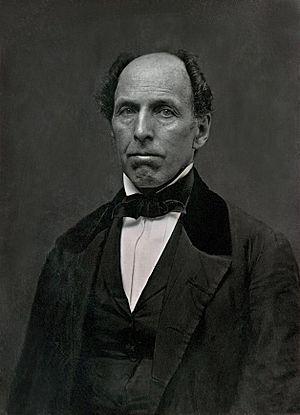Francis Jackson (abolitionist) facts for kids
Francis Jackson (1789–1861) was an important person who worked to end slavery in Boston, Massachusetts. He was part of several groups that fought against slavery, like the Massachusetts Anti-Slavery Society and the American Anti-Slavery Society. He also helped with a big land project in Boston in the 1830s.
Contents
About Francis Jackson
Early Life and Family
Francis Jackson was born in Newton, Massachusetts. His father, Timothy Jackson, fought in the American Revolutionary War. The family home, the Jackson Homestead, is still in Newton. Francis had several brothers and sisters, including William Jackson, who also spoke out against slavery.
Public Service and Land Development
Francis Jackson was involved in Boston's government. He served on the Boston City Council in 1823–1824 and again in 1826. In 1832, he was the "Land Commissioner" for the city.
From about 1833 to 1840, he worked for the South Cove Corporation. Boston was growing fast, and people needed more space. So, a company was formed to fill in a part of the harbor called the South Cove. Francis Jackson managed this huge project, which started in 1834 and finished in 1837. This work added 77 acres of new land to Boston!
Fighting Against Slavery
Francis Jackson was a strong abolitionist, meaning he believed slavery should be ended. He was part of the Underground Railroad, a secret network that helped enslaved people escape to freedom. He even hid many people in a room in his house on Hollis Street.
He was also involved in important events, like the trial of Anthony Burns in 1854, which was about a man who had escaped slavery. Jackson often led meetings for anti-slavery groups, like the New England Anti-Slavery Convention held at the Melodeon.
His Will and Legacy
When Francis Jackson died in 1861, he left a lot of money to support the fight against slavery and for women's right to vote. He wrote strongly about Massachusetts, saying that even though the state declared "all men are born free and equal," it still helped other states keep people enslaved. He wanted his money to help end this "injustice."
He also left money to other famous abolitionists and activists, including Lydia Maria Child, William Lloyd Garrison, and Lucy Stone.
Just four years after Jackson's death, slavery was legally ended in the United States by the 13th Amendment. Some of his relatives tried to stop his anti-slavery trust from being used as he intended. However, a judge decided that the money should still be used for a good cause. It was then used to create an educational charity for formerly enslaved people, helping them improve their lives.
His Children and Grandchildren
Francis Jackson had three children. His daughter, Eliza F. Meriam Eddy, had a son named Francis Jackson Meriam (1837-1865). He also joined the anti-slavery cause and even participated in John Brown's efforts against slavery, even though he was blind in one eye. Eliza's daughter, Sarah J. Eddy, became a photographer and also fought for women's right to vote.
Images for kids
See also
- Jackson Homestead, Newton, Mass.
 | Jackie Robinson |
 | Jack Johnson |
 | Althea Gibson |
 | Arthur Ashe |
 | Muhammad Ali |







